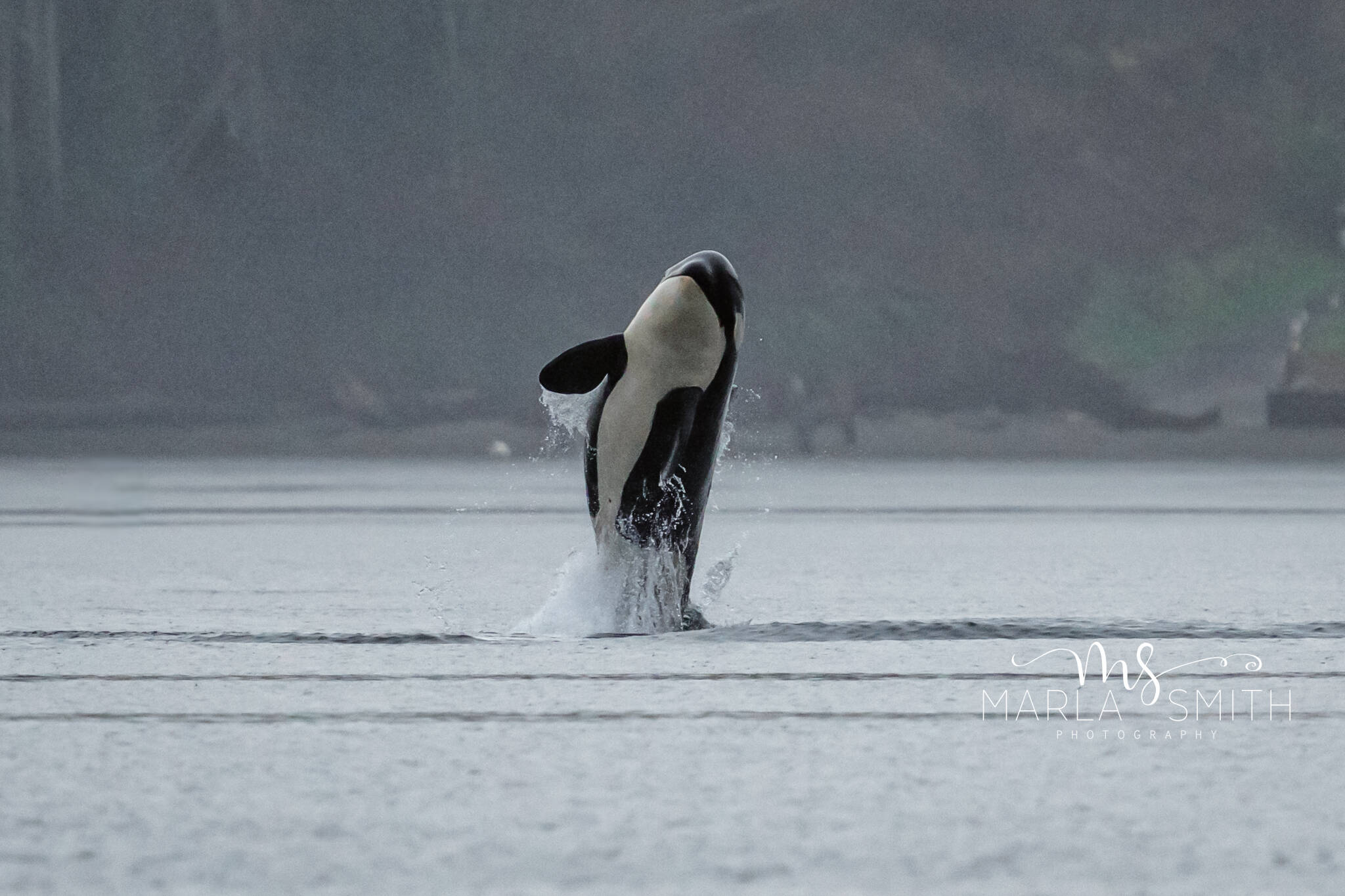Orcas and other whales passing by Vashon-Maury Island now have a new dedicated team of humans helping steer ships and other hazards out of their way.
The news was co-announced by U.S. Senator Maria Cantwell, who wrote the provisions authorizing the Whale Desk pilot program, which was signed into law in December 2022 as part of the National Defense Authorization Act.
The program was announced Feb. 21, the same day that members of the J Pod of the Southern Resident killer whales returned to the waters around Vashon Island for a brief visit. Those whales share the Puget Sound with ferries, container vessels, hobbyist boats and many more ships, all of which must be careful to avoid coming too close to killer whales and other cetaceans.
The whale desk system is based at the Coast Guard Seattle base. It allows that military branch to act in a role akin to air traffic controllers, Cantwell said in a statement, where for 24 hours a day and seven days a week, they can help guide sea vessels out of the way of orcas and other whales that navigate the Puget Sound.
It will bring together vessel operators, scientists and Coast Guard personnel, Cantwell said, to reduce encounters that disturb whales like noise pollution, oil spills and ship strikes.
Specifically, the whale desk will give vessel operators in Puget Sound near real-time data about the location of whales, according to the statement. It will also take reports on whale locations from the public. You can call the Whale Desk hotline to report whale sightings at 206-217-ORCA.
Data from the whale desk won’t just help keep cetaceans and sailors at a healthy distance from each other. It will also be used by researchers to track whale migration patterns, according to the statement.
The whale desk is part of a pilot program developed in concert with the tribes, state and federal agencies and scientists. The pilot program will run for four years, according to the statement.
Orca Annie Stateler, an Indigenous marine naturalist, educator, researcher, and founder of the Vashon Hydrophone Project, said that the Whale Desk pilot program would be particularly helpful to baleen whales — citing the deaths of two juvenile humpback whales after being struck by Washington State ferries. One was hit in 2020, near Mulikteo, the other was killed in Elliott Bay in 2019.
She also recalled that in May of 2017, a dead juvenile fin whale was struck and killed by a cargo ship outside of Puget Sound and was then towed to Spring Beach, on the island, to have a necropsy performed. The whale was lodged in the lower [bulbous] bow of the cargo ship when it came into the Port of Tacoma.
“It’s maddeningly common with fin whales — an endangered species — that they are getting hit in the commercial shipping lanes,” Stateler said
In terms of the Whale Desk program’s impact on critically endangered Southern Resident Killer Whales, she said that anything that would minimize stress on the species would be helpful.
“We cannot afford to lose a single Southern Resident to human carelessness,” she said.
Stateler said she hopes, for the Southern Residents, that the Whale Desk program will minimize some of the underwater noise that makes it so difficult for them to find their food and communicate with each other.
“This is a busy urban area, with ferries and container ships, as well as smaller recreational vessels that generate a tremendous amount of noise,” she said.
Stateler said the presence of any watercraft is especially disruptive to pregnant, lactating and other females with young offspring — having the boats too close and too noisy interferes with foraging and caregiving behavior.
Participation in the Whale Desk program is voluntary for ships, according to reporting by the Associated Press. But it should be required for all large commercial ships, Stateler said. She also suggested that the program should measure and track if underwater noise near whales has been reduced due to compliance with the program.
Still, Stateler added that the Whale Desk program will not address the biggest issues of the Southern Residents.
“Measures like this are helpful but they are not on the scale that is required to stave off the extinction crisis,” she said. “In the grand scheme of things, this doesn’t increase the Southern Residents’ food source, nor does it address their inbreeding or susceptibility to disease.”
Amy Carey, executive director of Puget Sound environmental watchdog group Sound Action, shared similar hopes — and restraint — about what the program could do for orcas and other whales.
The new Coast Guard desk is a welcome supplement to a network of existing research programs tracking the whales, Carey said.
“It’s not like it stepped into a void,” Carey said. “Where the whales are … in inland Puget Sound is tracked diligently, by Orca Network (and) multiple recording systems. … But the Coast Guard stepped in to formalize this for their role in vessel traffic oversight … it’s a good thing, and a big thing.”
But the new whale desk is just a piece of a larger puzzle of the Southern Resident’s edging toward extinction, Carey said.
“The really heartbreaking thing is that there’s not really a mystery,” she said. “We know what it is. We actually even know what we need to do.”
Destruction of spawning habitat for salmon, the prey of choice for southern resident killer whales, means the orcas simply do not have enough food. Researchers found two-thirds of their pregnancies ended in loss from 2007 to 2014, likely due mostly to a lack of nutrition.
“They are starving to death before our very eyes,” Carey said. “When it comes to this direct habitat loss, this is under the purview of permitting agencies, and they’re failing to do their job. … If we’re failing to address the habitat loss, and failing to remove dam structures, we’re not going to win this fight.”



